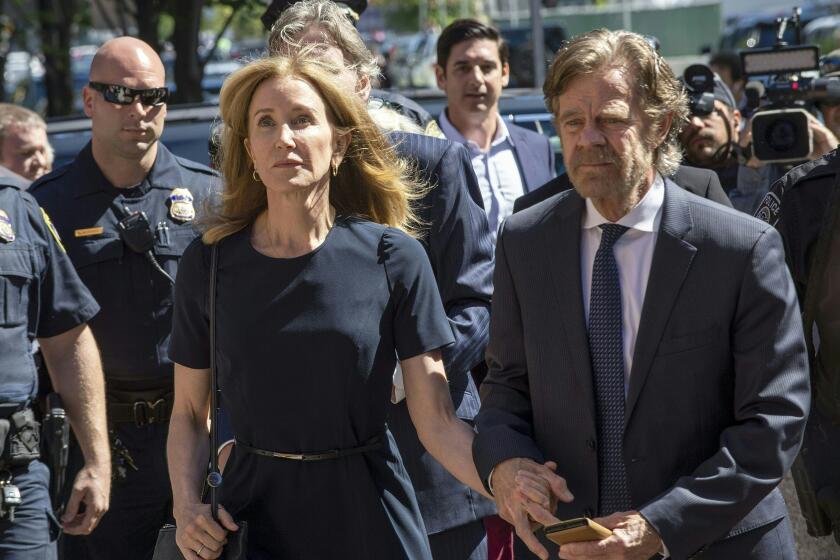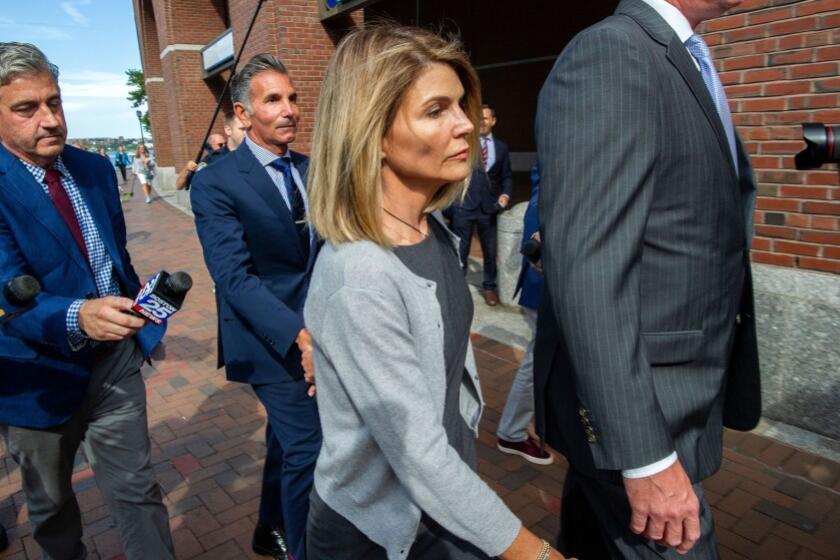Lori Loughlin to plead guilty in college admissions scandal, faces 2 months in prison

- Share via
Lori Loughlin, the television actress who for 14 months maintained her innocence in the college admissions scandal, has agreed to plead guilty to fraud and spend two months in federal prison, according to court documents unsealed Thursday.
Loughlin was arrested in March 2019 and charged with conspiring with William “Rick” Singer, a Newport Beach consultant at the heart of the scandal, to pass off her two daughters, Olivia Jade Giannulli and Isabella Rose Giannulli, as rowing recruits, all but guaranteeing their admission to USC.
Loughlin and her husband, J. Mossimo Giannulli, paid Singer $500,000 in all, prosecutors charged. Giannulli has agreed to plead guilty to fraud as well, court documents show.
For more than a year, the couple had insisted Singer misled them into believing the money was destined for legitimate university purposes, not bribes to corrupt school employees. This month, a judge batted down their request to have the charges dismissed for outrageous government misconduct.
Federal prosecutors and the couple’s attorneys agreed to ask a judge to sentence Loughlin and Giannulli to two and five months, respectively, in federal prison, the plea agreements say. Loughlin agreed to pay a fine of $150,000 and serve 100 hours of community service; her husband agreed to a $250,000 penalty and 250 hours of community service, the documents show.
If U.S. District Judge Nathaniel M. Gorton accepts these terms, prosecutors will drop the money laundering and bribery charges that a grand jury brought against the couple. They will plead guilty Friday and be sentenced at a later date.
There is no guarantee Gorton will accept the proposed punishments. Of the four parents he has sentenced to date, Michelle Janavs, a Newport Coast philanthropist who paid Singer $100,000 to fix her daughters’ exams and misrepresent one of the girls to USC as a recruited beach volleyball player, received the lightest sentence: a five-month prison term.
Gorton ordered Douglas Hodge, a former investment manager executive, to serve nine months in prison, the stiffest sentence handed down in the admissions case so far.
Federal prosecutors accused top CEOs, two Hollywood actresses and others of taking part in an audacious scheme to get their children into elite universities through fraud, bribes and lies.
“These defendants will serve prison terms reflecting their respective roles in a conspiracy to corrupt the college admissions process and which are consistent with prior sentences in this case,” U.S. Atty. Andrew E. Lelling, whose deputies prosecuted the case, said in a statement. “We will continue to pursue accountability for undermining the integrity of college admissions.”
Sean Berkowitz, an attorney for the couple, declined to comment.
Even in the account set forth in four successive indictments, Loughlin and Giannulli were not Singer’s most prolific conspirators. Other parents were accused of paying more money, for more years, to the benefit of more children.
And yet from the morning of March 12, 2019, when agents fanned out in Beverly Hills; Atherton, Calif.; Greenwich, Conn.; and other exclusive enclaves to arrest some 50 people, Loughlin and Giannulli have drawn outsize fascination — and ire — from the public.
In April 2019, Loughlin’s fans and detractors lined the sidewalk outside the federal courthouse in Boston where she made her initial appearance. Supermarket tabloids, citing unnamed sources said to be close to the actress, offered near-weekly updates on her state of mind.
Even as a grand jury returned three additional indictments, charging them with bribery and money laundering, Loughlin and Giannulli resisted taking a deal and maintained their innocence. Gorton had set a trial date for Oct. 5.
But the couple suffered a serious setback this month when Gorton denied their request to dismiss the indictment or, at the least, to throw out the recorded calls Singer made as a cooperator. Their attorneys argued that the federal agents overseeing Singer’s cooperation had browbeaten him into misleading his clients on the recorded calls, drawing out evidence of criminal intent where none existed.
Gorton declined to dismiss the indictment or suppress the calls. Questions of criminal intent, he ruled, should be decided by a jury.
In the government’s account — set out in four indictments and an FBI agent’s affidavit — Giannulli and Loughlin began conspiring with Singer in April 2016, when the fashion designer told Singer in an email, “I’d like to maybe sit with you after your session with the girls as I have some concerns and want to fully understand the game plan and make sure we have a roadmap for success as it relates to [our daughter] and getting her into a school other than [Arizona State University]!”
Singer told the couple that their daughter’s academic qualifications were “at or just below the low end of USC’s admission,” the affidavit said.
Los documentos muestran que Lori Loughlin se declarará culpable por su papel en el escándalo de admisión a la universidad
And so, prosecutors alleged, Loughlin and Giannulli agreed to tap what Singer called his “side door” into USC: bribing Donna Heinel, then an administrator in the school’s athletics department, to designate their two daughters as promising rowing coxswains. Heinel, who was arrested in March 2019 and fired by USC, has pleaded not guilty to conspiracy to commit racketeering, bribery and fraud.
The couple paid $500,000 in all, funneled through Singer’s charity, whose stated mission was to help “underprivileged students” but whose real purpose, Singer has acknowledged, was to pass money from parents to coaches and test administrators they wanted to bribe.
The tax-exempt status for Singer’s Key Worldwide Foundation allowed some of his clients to write off bribes as charitable gifts on their taxes, authorities said. Singer has pleaded guilty to four felonies and has yet to be sentenced.
More to Read
Sign up for Essential California
The most important California stories and recommendations in your inbox every morning.
You may occasionally receive promotional content from the Los Angeles Times.












